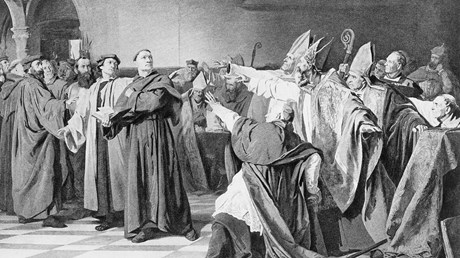Craig Harline portrays the suspense-filled early years of Martin Luther’s movement, when the outcome was anything but certain.

In this 500th anniversary year of the beginning of the Reformation, publications about the movement, and especially about its prime initiator Martin Luther, abound. Some books will treat him as an iconic figure whose bold declarations shaped Protestantism from its beginnings. Others may present the enormous impact the Reformation had on European history and culture, with Luther as the imposing force that got it all going. No one can deny that the Augustinian friar from Wittenberg University has exercised profound influence in the five centuries that have followed his 95 Theses. But it is altogether too easy to lose Luther the human being as we look back from historical distance. He can become a monumental figure, a bronze statue standing boldly against the background of our contemporary world.
Thankfully, that is not the Luther readers will find in Craig Harline’s book A World Ablaze: The Rise of Martin Luther and the Birth of the Reformation. Harline set out to write a treatment of Luther that would be accessible to the general reader, not primarily the fellow academic reveling in the intricacies of scholarly argument. For those who know the relevant primary and secondary sources, it is clear that Harline has done his research: He moves deftly among competing scholarly views and manifests thorough familiarity with the original sources. But he does so without the heavy weight of ponderous footnoting and citation. What he offers here is a winsome introduction to Luther as the movement that would eventually become the Protestant Reformation gets going with him.
But Harline writes in a way that does not assume the ultimate outcome. He writes “in the moment,” taking pains to present Luther as he moved, lurched …
Source: Christianity Today Most Read